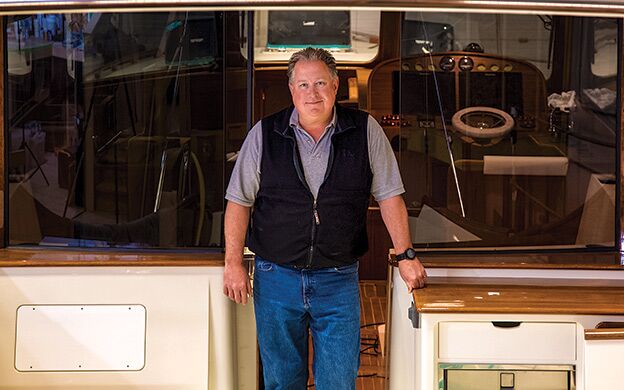Job training: Maine Community College System syncs with businesses to get people working
Ralph Jellison was in his early 50s when he lost his job with the closure of Verso Paper Corp.'s mill in Bucksport in April 2015.
The Department of Labor's Rapid Response Team introduced him to retraining options, including a six-month program to learn fine woodworking at Eastern Maine Community College in Bangor. He always liked woodworking, and the program's short duration seemed likely to get him working soon.
Jellison joined a program with connections to furniture makers and boat builders.
Chatting one day with other students, “I said, 'If Hinckley Yachts would hire me, I'd be down there in a minute,” Jellison recalls. “Lo and behold, I get a call from Hinckley maybe two weeks prior to school getting out, asking me if I'd be interested in employment. I was like, 'Yeah!' When I got back to school, I asked if anyone else got a call from Hinckley … There were five or six of us who got called.”
Hinckley has 260 employees in Trenton and 350 in Maine. It has ongoing demand for workers skilled in fine woodworking, composite work and marine electrical systems.
Jellison was hired by Hinckley in June 2016, and received further on-the-job training. He's since moved on to GAC Chemical in Searsport, where he could put his core skills in chemicals handling to work. The EMCC program, he says, was invaluable in helping him land work during a difficult period.
“I can't say enough good things about Eastern Maine's trade school,” he says. “It's just phenomenal — the instructors for one thing, and they have a good program and good equipment.”
Addressing Maine's workforce needs
Such outcomes are part of the Maine Community College System's mission, through its seven community colleges, to address Maine's workforce needs. That's accomplished through two-year associate degree programs, one-year occupational certificates and, like EMCC's carpentry program, customized training in conjunction with business.
“Our job is to provide education and training that meets the changing needs of the Maine economy,” says MCCS President Derek Langhauser. “Right now, with the pressures of the workforce and low unemployment and changes in demographics, businesses are screaming for skilled workers.”
To address that need, MCCS is constantly aligning programs with changing industry needs. It now seeks to expand outreach to business and add more customized and one-year occupational certificates. In 2016, 133 businesses and organizations contracted with community colleges to provide specialized training to some 2,000 people.
“The challenge is the changes are coming more quickly and substantially than in the past,” Langhauser says.
To address that challenge, virtually every occupational program is informed by industry advisors, who help MCCS keep up with new technologies; some also instruct.
At Hinckley, which builds high-end, customized production yachts in Trenton, General Manager Andy Fitzpatrick has chaired the industry advisory committee for EMCC's Building Construction and Fine Woodworking Technologies since its inception about four years ago.
“We recognized that we needed to find skilled workers to meet growing business demands,” says Fitzpatrick. “We also knew everyone who graduated from the program wouldn't necessarily be able to be hired by Hinckley. So we reached out to other businesses we knew also need woodworking people,” including Windham Millwork and Auburn-based furniture maker Thos. Moser.
The advisors assisted EMMC in crafting a core two-year curriculum of basic skills, with each company then providing further on-the-job training to hired graduates. Two grants from the U.S. Department of Labor also allowed EMCC to condense the program for displaced workers.
Hinckley has hired well over 20 employees from EMCC programs — both regular and displaced students. “The need for companies to find skilled labor to sustain and grow our businesses will continue,” says Fitzpatrick. “This EMCC partnership with industry has been a proven model and invaluable resource.”
Hinckley's careers page on its website lists openings for a marine carpenter, fiberglass-reinforced plastic fabricators, skilled varnishers, certified mechanics and licensed electricians.
More programs to come
MCCS plans to expand its business outreach, says Langhauser.
“On the business side, we need to do more outreach and be as responsive as we can to the needs of businesses — look at how they prioritize their training needs, whether and how they give employees release time or provide financial support for training or education, and how we can align the timing of our programs,” Langhauser says. For example, pilot programs in York County with the hospitality and construction industries seek to offer compressed training during off-peak months.
“We're working hard to identify what can we do differently,” Langhauser says. “But are there additional ways we can provide more flexibility and more outreach to business, students and incumbent workers?”
The results can be seen in MCCS's enrollment — up 71% since 2003. Accommodations for students — who are generally older, low-income and working at least part-time — include low tuition, financial aid, online options and flexible scheduling.
“We essentially provide workers who form the bedrock of the Maine economy,” says Langhauser.
At General Electric's Bangor site, which manufactures components for power plants and gas turbines, Nathan Sheranian, who handles HR for the site, is an enthusiastic proponent of the industry-MCCS relationship.
“This is an area we feel passionately about,” he says.
The power-plant steam and gas turbine component manufacturer offers three to four paid internships to precision machining students at Northern Maine and Kennebec Valley community colleges, he says. (GE also offers power technology maintenance internships to EMCC students.) Precision machining comprises 75% of the workforce. Recruitment ramped up rapidly after the recession, and GE's community college partnerships stemmed from the need for a robust pipeline of talent.
“They're placed with an experienced trainer and they're learning from day one how to run multi–million-dollar machinery,” Sheranian says. “In a month or six weeks, our interns are running these machines by themselves. So we say, 'If you perform well, we'll give you an offer to join us full-time after graduation.' On top of that, for folks we give an offer to, we reimburse their tuition for their second year. That's a huge benefit for the students and a tremendous boon to our recruitment efforts. Everyone we've offered to has accepted so far.”
One of those new employees is KVCC graduate Amelia Loureiro. A Maine native who studied precision machining in high school, she attended Maine Maritime Academy for a while, then enrolled in 2015 at KVCC for its focus on the skills that would feed her directly to a job. After an internship with GE in 2016, she was offered a position that started in January, along with reimbursement of her second year's tuition. Now age 21, working full-time and completing her last KVCC class, she's looking forward to returning to school at some point for a business degree. GE also offered to pay some of that tuition, she says — and she'll probably stick with the community college system.
“I've done the big-college, expensive route,” she says. “At a community college, you take the necessary courses to get into the job you want. And I like the small community college feel. You feel like you're being helped. I never felt like I was just another number.”













Comments